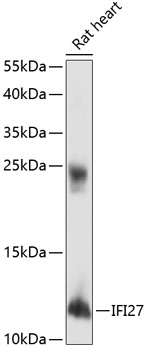-
Product Name
IFI27 Polyclonal Antibody
- Documents
-
Description
Polyclonal antibody to IFI27
-
Tested applications
WB
-
Species reactivity
Rat
-
Alternative names
IFI27 antibody; FAM14D antibody; ISG12 antibody; ISG12A antibody; P27 antibody; interferon alpha inducible protein 27 antibody
-
Isotype
Rabbit IgG
-
Preparation
Antigen: A synthetic peptide corresponding to a sequence within amino acids 1-100 of human IFI27 (NP_005523.3).
-
Clonality
Polyclonal
-
Formulation
PBS with 0.02% sodium azide, 50% glycerol, pH7.3.
-
Storage instructions
Store at -20℃. Avoid freeze / thaw cycles.
-
Applications
WB 1:500 - 1:2000
-
Validations

Western blot - IFI27 Polyclonal Antibody
Western blot analysis of extracts of rat heart, using IFI27 antibody at 1:1000 dilution.Secondary antibody: HRP Goat Anti-Rabbit IgG (H+L) at 1:10000 dilution.Lysates/proteins: 25ug per lane.Blocking buffer: 3% nonfat dry milk in TBST.Detection: ECL Basic Kit .Exposure time: 90s.
-
Background
Probable adapter protein involved in different biological processes. Part of the signaling pathways that lead to apoptosis. Involved in type-I interferon-induced apoptosis characterized by a rapid and robust release of cytochrome C from the mitochondria and activation of BAX and caspases 2, 3, 6, 8 and 9. Also functions in TNFSF10-induced apoptosis. May also have a function in the nucleus, where it may be involved in the interferon-induced negative regulation of the transcriptional activity of NR4A1, NR4A2 and NR4A3 through the enhancement of XPO1-mediated nuclear export of these nuclear receptors. May thereby play a role in the vascular response to injury (By similarity). In the innate immune response, has an antiviral activity towards hepatitis C virus/HCV. May prevent the replication of the virus by recruiting both the hepatitis C virus non-structural protein 5A/NS5A and the ubiquitination machinery via SKP2, promoting the ubiquitin-mediated proteasomal degradation of NS5A.
Related Products / Services
Please note: All products are "FOR RESEARCH USE ONLY AND ARE NOT INTENDED FOR DIAGNOSTIC OR THERAPEUTIC USE"
